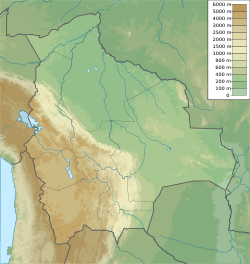Tunari (Bolivia) facts for kids
Quick facts for kids Tunari |
|
|---|---|
| Highest point | |
| Elevation | 5,035 m (16,519 ft) |
| Geography | |
| Location | Bolivia, Cochabamba Department |
| Parent range | Andes, Tunari mountain range |
Tunari is a tall and impressive mountain located in the Bolivian Andes mountain range. It stands about 5,023 meters (16,480 feet) high, making it a significant peak in the region. Tunari is part of the Tunari mountain range itself.
You can find this mountain in the Cochabamba Department of Bolivia, specifically in the Quillacollo Province, near the town of Quillacollo. It's situated northwest of Quillacollo and southeast of another peak called Wayna Tunari.
Contents
Where is Tunari Located?
Tunari is found in the heart of Bolivia, a country in South America. Its exact location is in the central part of the Cochabamba Department. This area is known for its diverse landscapes, from valleys to high mountains.
The Andes Mountains
The Andes are the longest continental mountain range in the world. They stretch along the western side of South America. Tunari is one of the many peaks that make up this vast mountain system. The Andes are famous for their high altitudes, unique wildlife, and rich history.
Tunari National Park
The area around Tunari mountain is protected as part of the Tunari National Park (Parque Nacional Tunari). This park was created to protect the natural environment, including the forests, water sources, and wildlife. It's a very important place for the local ecosystem.
What Can You See There?
The Tunari National Park is home to various plants and animals adapted to the high-altitude environment. You might find different types of trees, shrubs, and grasses. The park also helps protect important water sources that supply nearby cities like Cochabamba.
People often visit the park for hiking and enjoying nature. The views from the higher parts of the mountain range can be amazing, offering wide panoramas of the surrounding landscape.
Why is Tunari Important?
Tunari is important for several reasons. First, it's a major geographical landmark in the Cochabamba region. Its height and location make it stand out.
Second, the mountain and the national park play a crucial role in the environment. They help conserve biodiversity and protect water resources. The forests and ecosystems around Tunari are vital for the health of the region.
Finally, Tunari holds cultural significance for the local communities. Mountains are often seen as sacred places in Andean cultures, and Tunari is no exception. It's a symbol of the region's natural beauty and heritage.
See also
 In Spanish: Cerro Tunari para niños
In Spanish: Cerro Tunari para niños


